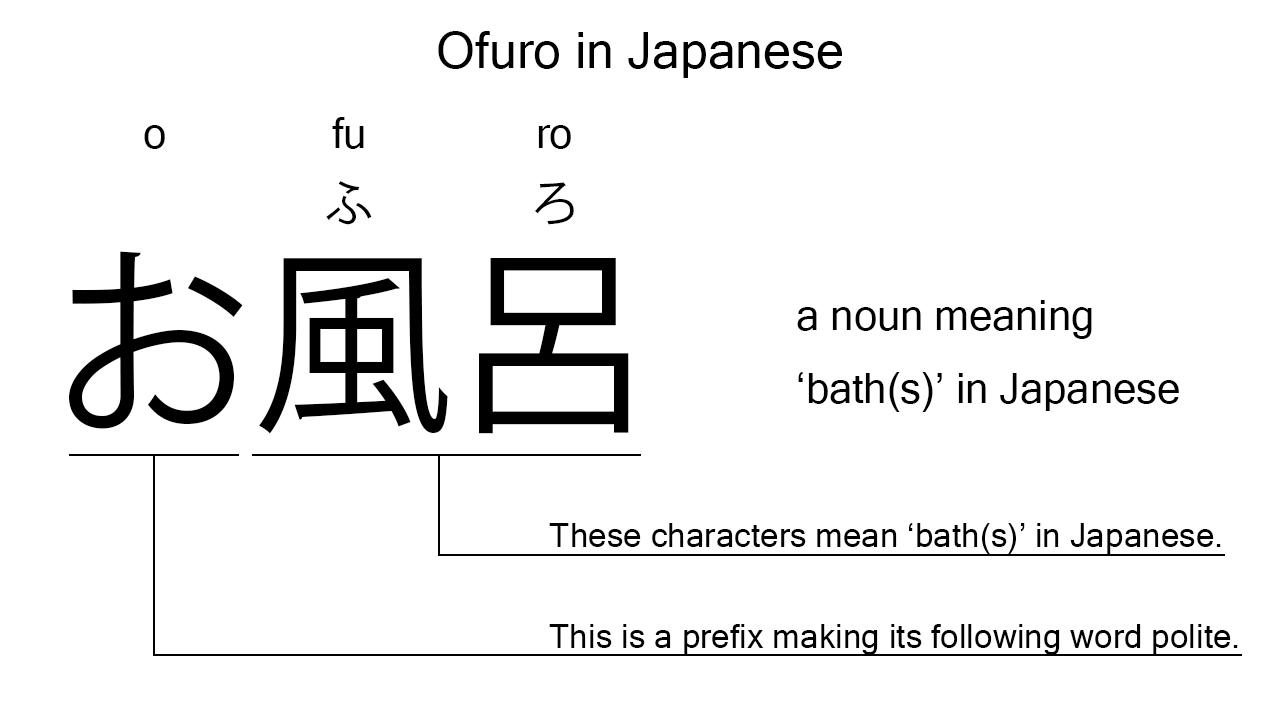What does “ofuro” mean in Japanese?
Native speakers say “ofuro” normally to mean ‘bath’ in Japanese. Perhaps, some Japanese learners know this word as it is sometimes used in Japanese movies, novels, manga, anime, and the like. In this blog post, however, I will explain it in detail based on its grammatical components. And also, I will explain how to use it through example sentences. My explanations would help Japanese learners understand “ofuro” more clearly. Then, let’s get started!
Contents
Definition and meanings of “ofuro”
Let me start with the definition and meanings of “ofuro”.
- ofuro – お風呂 (おふろ) : a noun meaning ‘bath’ or ‘bathtub’ in Japanese. This can also work as plural. Learn more about Japanese plural.
Native speakers use this noun to refer to a bath or bathtub in Japanese. In addition, they sometimes use this to refer to the act of taking a bath in Japanese.
The definition and meanings are not that difficult, I think. To understand this noun more clearly, however, let me explain its grammatical components in detail, one by one.
What does “ofuro” literally mean in Japanese?
“Ofuro” consists of the following two components:
- o – お : a prefix making its following word polite.
- furo – 風呂 (ふろ) : a noun meaning ‘bath’ or ‘bathtub’ in Japanese.
These two components tell us that “ofuro” is literally the Japanese polite expression for a bath. And actually, it is. Somehow Japanese people often use this polite expression to show their respect to baths.

When we meet new Japanese words, we should check their grammatical components in detail to understand their meanings clearly and deeply. In many cases, components tell us a lot about the meanings of the words they form. Actually, here, we could get the better understanding of “ofuro” through the detailed check above.
So far, I’ve explained the definition and meanings of “ofuro” together with its grammatical components. Then, let me explain how to use it through the example sentences below.
Example #1: how to say “take a bath” in Japanese
watashi wa mainichi ofuro ni hairu – 私は毎日お風呂に入る (わたしはまいにちおふろにはいる)
I take a bath every day.
Below are the new words used in the example sentence.
- watashi – 私 (わたし) : a pronoun meaning ‘I’ in Japanese.
- wa – は : a binding particle working as a case marker or topic marker. In the example, this works after “watashi” to make the subject in the sentence.
- mainichi – 毎日 (まいにち) : an adverb meaning ‘every day’ in Japanese.
- ni – に : a case particle used to say where someone or something goes. In the example, this is used after “ofuro” to say where the speaker goes into.
- hairu – 入る (はいる) : a verb meaning ‘to go in’, ‘to come in’, ‘to enter’, or such in Japanese.
This is a typical usage of “ofuro”. In this example, it works as a part of the commonly-used phrase, “ofuro ni hairu”, which literally means ‘to go in a bath’ in Japanese. It is often translated into English as just ‘to take a bath’, though.
Example #2: another usage of “ofuro”
boku wa ofuro ga suki desu – 僕はお風呂が好きです (ぼくはおふろがすきです)
I love taking a bath.
Below are the new words used in the example sentence.
- boku – 僕 (ぼく) : a pronoun meaning ‘I’ in Japanese. This is used mainly by boys and young males.
- ga – が : a case particle used to make the subject word or the object word in a sentence. In the example, this is used after “ofuro” to make the object in the sentence.
- suki – 好き (すき) : the stem part of the na-adjective, “sukina”, which means ‘favorite’ in Japanese. Native speakers, however, often use this as an individual word to mean ‘to like’ or ‘to love’ in Japanese. In the example, this is used to mean ‘to love’.
- desu – です : an auxiliary verb used after a noun or auxiliary verb to make it polite. Probably, this is well known as a part of Japanese desu form. In the example, this is used after “suki” to make it sound polite.
This is another typical usage of “ofuro”. In this example, it works together with the case particle, “ga”, to become the object in the sentence. The original meaning of the Japanese sentence is more like “I love baths”. It has been translated as “I love taking a bath”, though.
Summary
In this blog post, I’ve explained the definition and meanings of “ofuro” in detail based on its grammatical components. And also, I’ve explained how to use it through the example sentences. Let me summarize them as follows.
- ofuro – お風呂 (おふろ) : a noun meaning ‘bath’ or ‘bathtub’ in Japanese. This can also work as plural. Native speakers use this noun to refer to a bath or bathtub in Japanese. In addition, they sometimes use this to refer to the act of taking a bath in Japanese. From the grammatical point of view, this noun is literally the Japanese polite expression for a bath. And actually, it is. Somehow Japanese people often use this polite expression to show their respect to baths.
Hope my explanations are understandable and helpful for Japanese learners.
Leave a Reply